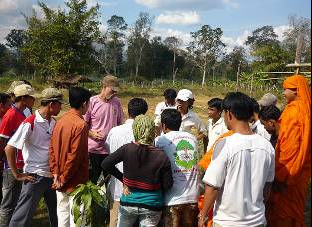 |
 |
 |
 Another training is being planned for some teachers from the Teacher’s College in Siem Reap. A primary focus of this training, besides introducing the participants to sustainable ideas and practices, will be engage the teachers in assisting us to create a permaculture curriculum for the government’s Life Skills Program. This program is part of all government schools in Cambodia and is intended to teach the children practical skills that they can take home and share with their parents. After this training a group of us will refine and structure the input from the teachers to create a permaculture curriculum that will not only provide techniques and skills, but also have sustainable understandings embedded in them. The courses in Svay Rieng and Ratanakiri are now fully booked. There could be some opening in short 1-2 days training that are still being planned. For more information about these and registration please contact Michael at singingtree café dot com.
Techniques to be covered in the 2010 trainings will include:
Permaculture and Relevance to Cambodian Agriculture Permaculture uses a combination of techniques to promote sustainable living, in part through designing agricultural systems to mimic natural ecologies. Many of these techniques dovetail with those already used in Cambodia as part of the Rice Intensification System, and advocated as part of an integrated Farming Systems Approach. Permaculture utilizes a local resource base, incorporating traditional knowledge and techniques which reduces necessary inputs. Complexity and diversity within a system is created through simple to understand techniques and strategies, for both land-based systems and human habitation systems, leading to inherently resilient and sustainable environments. Soil nutrient cycling and water cycling are key concepts, and emphasis is on local materials and locally adapted solutions. 2009 Training In 2009, we have organized two x one-week long courses, the first was an in-house course facilitated for IVY (International Volunteers of Yamagata) which enhances Women's Participation Rural Development Through Sustainable Agriculture. The second course was organized for Harmony Farm. Techniques covered in the 2009 trainings included soil nutrient cycling, discussing methods of composting, mulching, harvesting and indigenous micro-organisms. Intercropping and diversity will focus on complex diverse plantings and planting patterns which emphasize perennials to promote resiliency and long term sustainability, as well as reducing necessary yearly inputs. The best use of locally adapted plants to create an intercropping system to boost production for household consumption and integration of ‘food forests’ and fish ponds, along with contouring methods, are also introduced. For water management, catching available water and recycling it and maintaining in the system for maximum efficiency and resource cycling are key concepts (rainwater catchments systems, irrigation, wastewater management systems, underground catchments, aquaculture). Examples of practice already employed in other developing countries, and hands-on field work and mapping exercises, along with local field trips, were a key part of the learning process. 2008 Training A two week course was held in December 2008 in Siem Reap with 18 participants, mostly from local NGOs. The local restaurant and community center the Singing Tree organized the course, taught by Richard Rico Zook. Astraljester Films from Phnom Penh made a 30 minute documentary. |